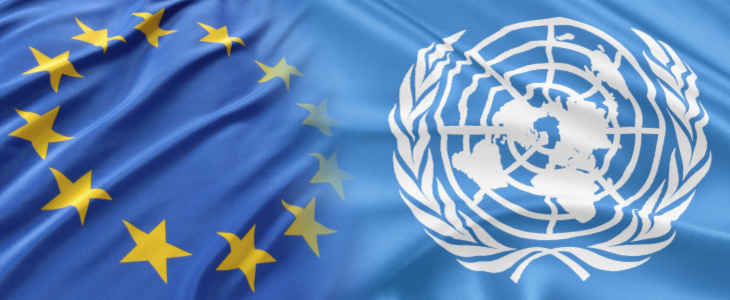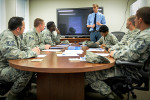UNPIP

UN Peacekeeping Intelligence Programme
Applying contemporary intelligence tradecraft to international standards within the constraints of a peacekeeping environment.
The UN Peacekeeping Intelligence Programme (UNPIP) takes students with a fundamental understanding of military or civilian peacekeeping operations to the level of knowledge and skill required to conduct intelligence operations. Built on revised Peacekeeping Intelligence Surveillance and Reconnaissance (PKISR) standards and guidance prescribed by the UN Department of Peace Operations, the course introduces the constraints imposed upon modern peacekeeping and the UN intelligence model and architecture.
The programme supports existing pre-deployment, in-theatre and unit training by demonstrating variations on traditional tactics, techniques and procedures. The encouragement of creative approaches, facilitates the production of finished intelligence and optimal exploitation of collection disciplines within established legal frameworks.
Target Audience
The course is oriented towards trained and experienced security professionals. Therefore, in addition to the usual minimum requirements for all Institute training, applicants should also posses international peacekeeping pre-deployment training or be sceduled to undertake it shortly. Historically, the programme has attracted the following representation:
| Internationals: Representatives from EU, UN and other international agencies, missions and institutions. | Nationals: National intelligence, military and law-enforcement delegates attending on behalf of UN member states. | ||
| Non-Profits: Functionaries in a position of public trust representing the media, NGOs, charitable and other third sector organisations. | Others: Professionals from the private sector, academia and other organisations. |
Learning Objectives
|
Intelligence Concepts: Explain the peacekeeping intelligence cycle, key roles, responsibilities, functions and organisation. |
|
|
Surveillance Law: Recognise the principles of proportionality and necessity, comply with international law and uphold human rights. |
|
|
Intelligence Analysis: Exploit and process intelligence material, collating information for all-source analysis. Draw on archived material to produce terrain analysis, intelligence estimates, threat/situation assessments and human terrain assessment. Conduct battle damage assessments exploiting unmanned aerial systems where necessary. Synthesise, interpret and integrate information from different sources and validate, verify, grade and evaluate sources and information for intelligence production. Employ structured analytic techniques including contrarian and critical analysis and use analytical software, tools and techniques to produce routine and specific finished intelligence products in line with analytic writing standards. Securely circulate compartmentalised finished intelligence products on a need-to-know basis. Synchronise tasking and reporting with intelligence production for intelligence fusion and reconciliation. |
|
|
Operational Planning: Maintain situational awareness necessary to functioning within an operational environment. Appropriately organise intelligence activities and tasks to conduct auditable operations in accordance with documented orders from legitimate authorities. Understand the restrictions and constraints upon UN collection activities and the strengths and limitations of collection capabilities. Conduct intelligence operational mission analysis and planning, contingency planning, wargaming, operational co-ordination and review. Conduct collection planning and tasking, including prioritisation, synchronisation and managing requests for information. |
|
|
Reconnaissance: Conduct sustained reconnaissance planning for surveillance observation in urban and rural hostile environments. Co-ordinate surveillance and reconnaissance support, develop a communications plan and issue deployment/warning orders. Conduct mission preparation, including drill, force protection and mission briefings. Move covertly and adjust formation based on the terrain and threat and collect geospatial, human terrain, communication, threat and security information. Collect evidentiary material on human rights violations, abuses and other criminal activities. Sustain field reconnaissance deployments for up to 30 days, implementing force protection and security measures as appropriate. Report information of intelligence value through secure dedicated channels and conduct follow-up tasks. Covertly infiltrate/exfiltrate an area using cover and concealment and locate surveillance targets. Use special communications networks, communicate effectively using secure radio and conduct basic field repairs of specialised equipment. Maintain communications and provide updates when deployed, requesting necessary special equipment and maintain it in a serviceable condition. |
|
|
Human Intelligence: Manage sensitive sources and keep proper records of human source debriefs andmeetings. Manage the emplacement of sources and sensors through an effective collection strategy consistent with the commanders intent, areas of interest and technical focus. Understand, identify and satisfy intelligence requirements in an operational environment. |
|
|
Signals Intelligence: Utilise source and sensor profiling for optimal deployment accommodating for weather, terrain and threats. Conduct SIGINT collection operations, de-conflicting sensors, recording and collating sensor outputs and metadata. Deploy imagery and signals collection platforms to search for potential concealed threats and deliver tactical intelligence information. Search, intercept and monitor electronic communications, including GSM, satellite and other relevant frequencies. Identify and track emitters and sources, recording and analysing content. Provide insight into intent and organisational structures by using SIGINT to identify key individuals, roles, groups and movement. Decrypt and transcribe fax, voice, SMS and other traffic, translating in real-time. Make an appropriate selection of sensors and platforms for the collection of imagery. |
Course Format
The UN Peacekeeping Intelligence Programme is designed to develop international skills and knowledge as a peacekeeping intelligence officer so peacekeepers can more easily deploy into intelligence environments. To develop these skills a variety of formats and delivery methods have been used including:
- Flexible Delivery: Workshops and exercises as well as traditional lectures.
- Blended Learning: The latest iteration of the course combines preparatory training via our e-learning platform with consolidated learning in an intensive attendance programme.
Part 1 - e-Learning
Prior to attendance each candidate must pass a preparatory e-learning programme delivered over no less than three months. Candidates are free to sign up and begin study at any time and on their own schedule.

Block 1
Intelligence Concepts & Law

Block 2
Intelligence Analysis

Block 3
Operational Planning

Block 4
Reconnaissance

Block 5
Human Intelligence

Block 6
Signals Intelligence
Part 2 - Online School
After completion of the e-learning programme in Stage I, more sensitive information and practical training needed to conduct peacekeeping intelligence operations will be delivered in an intensive weekend programme over two consecutive days. Due to the international audience, delivery is exclusively by video-conferencing online.

Day 1
Intelligence & Analysis

Day 2
Covert Collection
Dates & Times
Candidates are free to sign up and begin studying the e-learning component at any time and on their own schedule. The online school runs annually as needed. Applications take approximately 4 weeks to process but security vetting may take up to 6 months to complete for applicants who lack a current security clearance. The extensive pre-qualifying e-learning course takes at least 3 months to complete and candidates may not be admitted to the online school without having achieved at least a passing grade on the e-learning element.
Assessment
Assessment may be by any valid and accredited competency assessment meeting course requirements. However, competency is most commonly evidenced through the following combination of assessment methods:
- A pre-selection dossier including validated: security vetting, professional/academic reference checks, higher education certification (degree-level or equivalent), fitness/medical checks, evidence of a relevant career history and assessed knowledge in international security.
- An approved assessor's independent testimony of observed competency throughout at least 10 hours of supervised professional practice.
Standards
Courses are fully accredited for compliance with international standards. For further details on Institute requirements, international standards and accreditation, view the Accreditation page.
Certification
The UN Peacekeeping Intelligence Programme (UNPIP) is a Continuing Professional Development (CPD) course, not a formalised qualification.
Fees & Discounts
Not including individual expenses, the course is delivered at a cost of €1500. Payment is accepted by bank transfer, card or PayPal. The following discounts are available:
|
|
Group Rate: If you are booking on behalf of a group, further incentives may apply. Please contact the head of the training and directing staff for further details. |
Location
Online.
